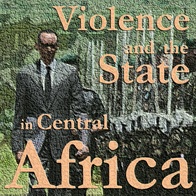
How civil wars end
There is a tendency, even among scholars, to view civil wars as involving two actors—the “government” and “rebels.” This presumption likely arises because historical civil wars that have received the most attention—such as the American and Chinese civil wars—were generally fought between two recognized, organized combatants. Yet, many civil wars (both historical and modern) involve more than two actors.
Take the current civil war in Syria. The Syrian government battles a series of rebel groups that generate a large number of acronyms—ISIS, SLA, SIF, and so on—and that frequently fight amongst themselves. These groups often seek to form coalitions to coordinate their opposition, but the coalitions are unstable and have difficulty controlling their constituent parts. The Syrian conflict also has a large level of external involvement, with the government receiving direct military support from Iran and Hezbollah plus a large number of additional external states and non-state actors seeking to turn the course of the war.
The Syrian opposition’s fragmentation is extreme, but the multiparty nature of the conflict is by no means unique. In fact, many of the wars that have received the most international attention in recent decades—such as in Afghanistan, Columbia, the Democratic Republic of the Congo, Iraq, the Palestinian conflict in Israel, the Darfuri war in Sudan, and Somalia—have involved several rebel groups and significant external involvement.

Are we fighting a just war against the Islamic State?
This question is a little provocative so a clarification is in order. There is a distinction between whether a war is just (jus ad bellum) and whether it is being conducted in a just manner (jus in bello). In the case of IS it is incontrovertible that there is just cause for war. I have argued elsewhere that what is happening in IS occupied territory is attempted genocide. This legitimises military intervention, especially since the Iraqi government has requested help. What I wish to examine here is whether this war is being conducted justly.
Just war theory provides us with several principles that limit what is morally permissible in war. There are two principles that give us cause for concern when assessing the intervention against IS: proportionality and non-combatant immunity. The first of these is the idea that the means of war must be proportional to the ends. Soldiers should aim for victory, but this does not mean that victory can be pursued by any means necessary. There must be, to use Michael Walzer’s term, an ‘economy of force’ (Walzer, Just and Unjust Wars, 129-33). A general should not waste the lives of his soldiers in a bloody offensive when there are more economical means to victory. He should not resort to tactics that will produce longstanding bitterness and prolong the war (such as taking no prisoners).

Paying your soldiers and building the state in post-genocide Rwanda
Ensuring soldiers have legal access to financial resources is crucial for the state to fulfil its primary mission: retain the monopoly of violence. As seen in the Democratic Republic of Congo, difficulties providing soldiers with adequate resources may result in deteriorating discipline, corruption, defection, and human rights abuses.
Rwanda after the genocide faced the difficult task of paying its soldiers. The post-1994 situation made this challenge inescapable. The Rwandan Patriotic Front (RPF) took power in a ruined country. The economy was entirely destroyed, and fleeing officials of the previous regime had emptied state coffers. The resources to pay soldiers were virtually non-existent. In addition, following the RPF victory, many families returned from exile to Rwanda. Consequently, soldiers of the Rwandan Patriotic Army (RPA, the armed wing of the RPF) were not just guerrilla fighters anymore: they became fathers, husbands, or brothers again. This new financial burden on soldiers’ shoulders created a form of indiscipline largely unknown until then in the RPA’s ranks. In addition, the meagre salaries were made in cash, transported by intermediaries from the Ministry of Defence to soldiers, which multiplied the opportunities for embezzlement and the creation of ‘ghost soldiers’. Worse, the opportunities for soldiers to borrow money were extremely limited at the time. Many had no property in Rwanda and consequently no collateral to offer to the few banks still functioning.
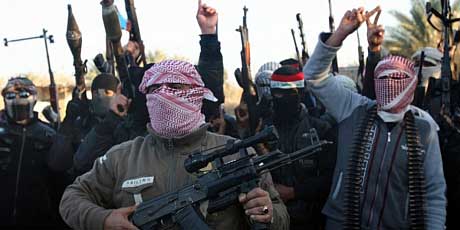
Is bombing ISIS atrocity prevention or a token gesture ?
Last week, the UK government voted, by a huge majority of 481 MPs, to engage in military action in Iraq. Now, once again, we are effectively at war in the Middle East.
For anyone committed to humanitarian inclinations, military force – so easily legitimated through hyperbolic statements of threat, and dramatic images of missiles precisely destroying targets through an aircraft’s gun-sights – should be treated with deep scepticism. Yet the tendency to reflexively reject and virulently condemn military action out of hand is no less lacking in critical reflection than the mindless swallowing of hawkish hyperbole.
The international community has rightly been condemned for standing by and allowing genocide to occur in Rwanda in 1994, and in Darfur in 2003. Is this a similar case? The unfolding and deepening disaster in Iraq seems very much of our own making; so will inaction make us again culpable in unspeakable human suffering? Or is the impulse to fight mere atavistic “war fever”?[1] To answer these questions we need to interrogate two more: first, is the threat of ISIS as great as is claimed? And second, will military action do any good?

And so it continues…: Rwandan refugees and the latest bilateral politicking in the Great Lakes
The year 2002 marked the initiation of discussions concerning the suitability of invoking Article 1C(5) of the 1951 Convention Relating to the Status of Refugees to deal with the protracted Rwandan refugee caseload. This Article permits a declaration by countries and UNHCR that ‘the circumstances in connexion with which he [the refugee] has been recognised as a refugee have ceased to exist’, and therefore ‘he can no longer…continue to refuse to avail himself of the protection of the country of his nationality.’ In short, the ‘ceased circumstances’ Cessation Clause constitutes an international validation of positive change in post-conflict governance and the meaningful re-establishment of the citizen-state bond, as well as providing a legal normative framework for the repatriation of former refugees.
It is easy to see why the GoR so earnestly pushed for the invocation of the Cessation Clause throughout the Noughties. Internal and external legitimacy was waning under the weight of mounting evidence that domestic politics was partisan and exclusionary at best, authoritarian and murderous at worst. The regime wanted to repatriate potential opponents back to within the state’s jurisdiction. Achieving international consensus over the suitability of refugees returning to Rwanda was thus a potential way to refute accusations concerning human rights abuses within the country, and to exercise more control over possible critics. Controversially, the High Commissioner for Refugees announced support for the cancellation of status for all Rwandan refugees by the end of 2011. After seven years of lobbying and contestation, this therefore constituted a major victory for the RPF.
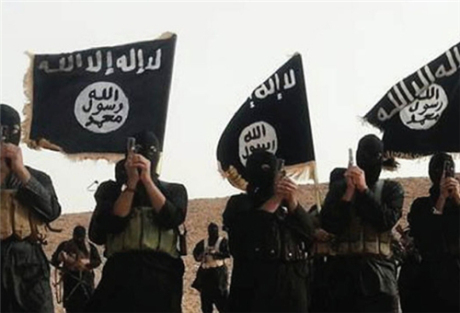
Is the Islamic State committing genocide?
Recently I had a chance to visit the Christian community of Tur Abdin in Eastern Turkey, a long standing community. The monasteries where I stayed dated to the 5th century AD. The people are generous and welcoming, but there is certainly a feeling of isolation and anger in the community as well. You can see Syria stretching out in the distance from the Mor Hananyo Monastery. The people have family and friends in Syria and Iraq. These are the Christians who have been subjected to the brutality of the Islamic State (IS) along with the Yazidi, Shabak and Shia people of the region. Yet, this is nothing new to the people of Tur Abdin.
The monasteries, with their austere beauty and clockwork way of life, give the impression of tranquility. The reality is that this region of the world has been subjected to repeated instances of inter-ethnic and inter-religious conflict. All but one of the people I spoke about the region and its history had lost family in the pogroms of the late 19th century, the terrible bloodletting that accompanied the collapse of the Ottoman Empire, down to the recent conflict between Ankara and the Kurds. Violence is woven into the historical fabric of life in Tur Abdin.
The people are horrified and scared of what is happened a few kilometers from their homes, but they do not expect anyone to help. They’ve seen this before. The international community condemns, prevaricates and retreats. Admittedly, things are starting to happen. Airstrikes against IS have escalated and now include strikes in Syrian territory. Greater assistance is being given to the Kurdish Peshmerga, moderate Syrian forces and the Iraqis. However, this is insufficient. The world needs to decisively intervene in this conflict because the Islamic State is attempting to commit genocide against the minorities in their territory and we all have an obligation to stop them.
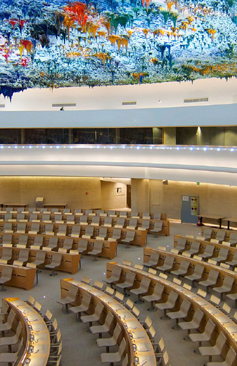
The risk of trivialising international law
The appointment by the United Nations Human Rights Council of a special commission to investigate Israeli actions during the latest war in the Gaza Strip seems to confirm the skepticism with which that organization is held by many people in North America and Europe.
The UN Human Rights Council replaced in 2006 the UN Human Rights Commission. Unfortunately, the change in name was not followed by a change in attitude.
The obsessive concentration on Israel, at the expense of many other countries where human rights are flagrantly violated, is not the exclusive purview of the UN Human Rights Commission, to be sure. The UN in general tends to devote more time to Israel than to any other country; so much so that one wonders if Israel did not exist what would the UN do with so much spare time left.
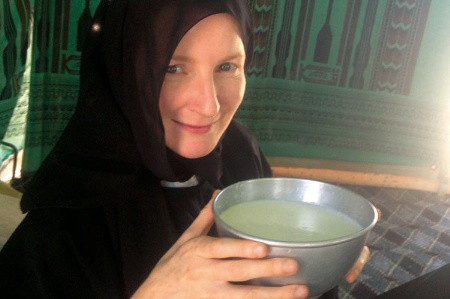
Oxford to Yemen: from literary scholar to tribal adviser
In today’s academic environment, two watchwords that crop up on most project target lists are interdisciplinarity and impact. Find out how both are being brought to bear on new research in the outlying tribal regions of Yemen. As a Senior Research Fellow and Arabic specialist I have been working in Egypt and Yemen in the years following the outbreak of the Arab Spring in 2010. My research started in Egypt with a survey of media, culture and public opinion in the aftermath of the revolution, together with political scientists from Oxford’s DPIR and Cairo University. At the same time, my study of the use of poetry in Yemen’s jihadist journals brought me to a new political interest in how Yemen’s transition to a federal system is playing out in Yemen’s eastern regions. Together with local tribesmen, I sought to gather popular opinion on the range of social, economic and political challenges facing them, which in turn precipitated the formation of an elected cross-tribal council. I’m continuing to talk to governments and the UN about problems faced by the tribes in eastern Yemen and the associated political instability.









